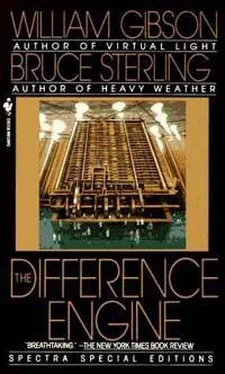William Gibson - The Difference Engine
Здесь есть возможность читать онлайн «William Gibson - The Difference Engine» весь текст электронной книги совершенно бесплатно (целиком полную версию без сокращений). В некоторых случаях можно слушать аудио, скачать через торрент в формате fb2 и присутствует краткое содержание. Жанр: sf_cyber_punk, fantasy_alt_hist, на английском языке. Описание произведения, (предисловие) а так же отзывы посетителей доступны на портале библиотеки ЛибКат.
- Название:The Difference Engine
- Автор:
- Жанр:
- Год:неизвестен
- ISBN:нет данных
- Рейтинг книги:3 / 5. Голосов: 1
-
Избранное:Добавить в избранное
- Отзывы:
-
Ваша оценка:
- 60
- 1
- 2
- 3
- 4
- 5
The Difference Engine: краткое содержание, описание и аннотация
Предлагаем к чтению аннотацию, описание, краткое содержание или предисловие (зависит от того, что написал сам автор книги «The Difference Engine»). Если вы не нашли необходимую информацию о книге — напишите в комментариях, мы постараемся отыскать её.
The Difference Engine — читать онлайн бесплатно полную книгу (весь текст) целиком
Ниже представлен текст книги, разбитый по страницам. Система сохранения места последней прочитанной страницы, позволяет с удобством читать онлайн бесплатно книгу «The Difference Engine», без необходимости каждый раз заново искать на чём Вы остановились. Поставьте закладку, и сможете в любой момент перейти на страницу, на которой закончили чтение.
Интервал:
Закладка:
"Certainly, sir. I'll see that you're given a key."
"Lord Gideon Mantell taught me everything I knew about the modeling of plaster," Mallory declared, with a show of nostalgia. "It's been too long since I last came to grips with that worthy craft. It will be a great pleasure to observe the latest advances in technique, in such exemplary surroundings."
Huxley smiled, with a hint of dubiousness. "I do hope we can satisfy you, Ned."
Mopping the back of his neck with a kerchief. Mallory unhappily contemplated the headquarters of the Central Statistics Bureau.
Ancient Egypt had been dead for twenty-five centuries, but Mallory had come to know it well enough to dislike it. The French excavation of the Suez Canal had been an heroic business, so that all things Egyptian had become the Parisian mode. The rage had seized Britain as well, leaving the nation awash with scarab neck-pins, hawk-winged teapots, lurid stereographs of toppled obelisks, and faux-marble miniatures of the noseless Sphinx. Manufacturers had Engine-embroidered that whole beast-headed rabble of pagan godlets on curtains and carpets and carriage-robes, much to Mallory's distaste, and he had come to take an especial dislike to silly maunderings about the Pyramids, ruins which inspired exactly the sort of chuckle-headed wonderment that most revolted his sensibilities.
He had, of course, read admiringly of the engineering feats of Suez. Lacking coal, the French had fueled their giant excavators with bitumen-soaked mummies, stacked like cordwood and sold by the ton. Still, he resented the space usurped by Egyptology in the geographical journals.
The Central Statistics Bureau, vaguely pyramidal in form and excessively Egyptianate in its ornamental detail, squatted solidly in the governmental heart of Westminster, its uppermost stories slanting to a limestone apex. For the sake of increased space, the building's lower section was swollen out-of-true, like some great stone turnip. Its walls, pierced by towering smokestacks, supported a scattered forest of spinning ventilators, their vanes annoyingly hawk-winged. "The whole vast pile was riddled top to bottom with thick black telegraph-lines, as though individual streams of the Empire's information had bored through solid stone. A dense growth of wiring swooped down, from conduits and brackets, to telegraph-poles crowded thick as the rigging in a busy harbor.
Mallory crossed the hot sticky tarmac of Horseferry Road, wary of the droppings of the pigeons clustered in the web-work of cable overhead.
The Bureau's fortress-doors, framed by lotus-topped columns and Briticized bronze sphinxes, loomed some twenty feet in height. Smaller, work-a-day doors were set into their corners. Mallory, scowling, strode into cool dimness and the faint but pervasive odors of lye and linseed oil. The simmering London stew was behind him now, but the damned place had no windows. Egyptianate jets lit the darkness, their flames breezily guttering in fan-shaped reflectors of polished tin.
He showed his citizen-card at the visitors' desk. The clerk—or perhaps he was some sort of policeman, for he wore a new-fangled Bureau uniform with an oddly military look—made careful note of Mallory's destination. He took an Engine-printed floor-plan of the building from beneath his counter, and marked out Mallory's twisting route in red ink.
Mallory, still smarting from the morning's meeting with the Nominations Committee of the Geographical, thanked the man rather too brusquely. Somehow—he didn't know which devious strings had been pulled back-stage, but the plot was clear enough—Foulke had maneuvered his way onto the Geographical's Nominations Committee. Foulke, whose aquatic theory of Brontosaurus had been spurned by Huxley's museum, had taken Mallory's arborivore hypothesis as a personal attack, with the result that an ordinarily pleasant formality had become yet another public trial for radical Catastrophism. Mallory had won his Fellowship, in the end, Oliphant having laid the ground too well for Foulke's last minute ambush to succeed, but the business still rankled. He sensed damage to his reputation. Dr. Edward Mallory—"Leviathan Mallory," as the penny-papers insisted on having it—had been made to seem fanatical, even petty. And this in front of dignified geographers of the first rank, men like Button of Mecca and Elliot of the Congo.
Mallory followed his map, muttering to himself. The fortunes of scholarly warfare, Mallory thought, had never seemed to favor him as they did Thomas Huxley. Huxley's feuds with the powers-that-be had only distinguished him as a wizard of debate, while Mallory was reduced to trudging this gas-lit mausoleum, where he hoped to identify a despicable race-track pimp.
Taking his first turn, he discovered a marble bas-relief depicting the Mosaic Plague of Frogs, which he had always numbered among his favorite Biblical tales. Pausing in admiration, he was very nearly run down by a steel push-cart, stacked to the gunwales with decks of punch-cards.
"Gangway!" yelped the carter, in brass-buttoned serge and a messenger's billed cap. Mallory saw with astonishment that the man wore wheeled boots, stout lace-ups fitted with miniature axles and spokeless rounds of rubber. The fellow shot headlong down the hall, expertly steering the heavy cart, and vanished around a corner.
Mallory passed a hall, blocked off with striped sawhorses, where two apparent lunatics, in gas-lit gloom, crept slowly about on all fours. Mallory stared. The creepers were plump, middle-aged women, dressed throat-to-foot in spotless white, their hair confined by snug elastic turbans. From a distance their clothing had the eerie look of winding-sheets. As he watched, one of the pair lurched heavily to her feet and began to tenderly wipe the ceiling with a sponge-mop on a telescoping pole.
They were charwomen.
Following his map to a lift, he was ushered in by a uniformed attendant and carried to another level. The air, here, was dry and static, the corridors busier. There were more of the odd-looking policemen, admixed with serious-looking gentlemen of the capital: barristers perhaps, or attorneys, or the legislative agents of great capitalists, men whose business it was to acquire and retail knowledge of the attitudes and influence of the public. Political men, in short, who dealt entirely in the intangible. And though they presumably had their wives, their children, their brownstone homes, here they struck Mallory as vaguely ghost-like or ecclesiastical.
Some yards on. Mallory was forced to abruptly dodge a second wheeled messenger. He caught himself against a decorative cast-iron column. The metal scorched his hands. Despite its lavish ornamentation—lotus blossoms—the column was a smokestack. He could hear it emitting the muffled roar and mutter of a badly adjusted flue.
Consulting his map again, he entered a corridor lined left and right with offices. White-coated clerks ducked from door to door, dodging young messenger-boys rolling about with card-laden wheelbarrows. The gas-lights were brighter here, but they fluttered in a steady draft of wind. Mallory glanced over his shoulder. At the end of the hall stood a giant steel-framed ventilator-fan. It squealed faintly, on an oiled chain-drive, propelled by an unseen motor in the bowels of the pyramid.
Mallory began to feel rather dazed. Likely this had all been a grave mistake. Surely there were better ways to pursue the mystery of Derby Day, than hunting pimps with some bureaucratic crony of Oliphant's. The very air of the place oppressed him, scorched and soapy and lifeless, the floors and walls polished and gleaming… He'd never before seen a place so utterly free of common dirt… These halls reminded him of something, another labyrinthine journey…
Lord Darwin.
Mallory and the great savant had been walking the leaf-shadowed hedgy lanes of Kent, Darwin poking at the moist black soil with his walking-stick. Darwin talking, on and on, in his endless, methodical, crushingly detailed way, of earthworms. Earthworms, always invisibly busy underfoot, so that even great sarsen-stones slowly sank into the loam. Darwin had measured the process, at Stonehenge, in an attempt to date the ancient monument.
Читать дальшеИнтервал:
Закладка:
Похожие книги на «The Difference Engine»
Представляем Вашему вниманию похожие книги на «The Difference Engine» списком для выбора. Мы отобрали схожую по названию и смыслу литературу в надежде предоставить читателям больше вариантов отыскать новые, интересные, ещё непрочитанные произведения.
Обсуждение, отзывы о книге «The Difference Engine» и просто собственные мнения читателей. Оставьте ваши комментарии, напишите, что Вы думаете о произведении, его смысле или главных героях. Укажите что конкретно понравилось, а что нет, и почему Вы так считаете.









